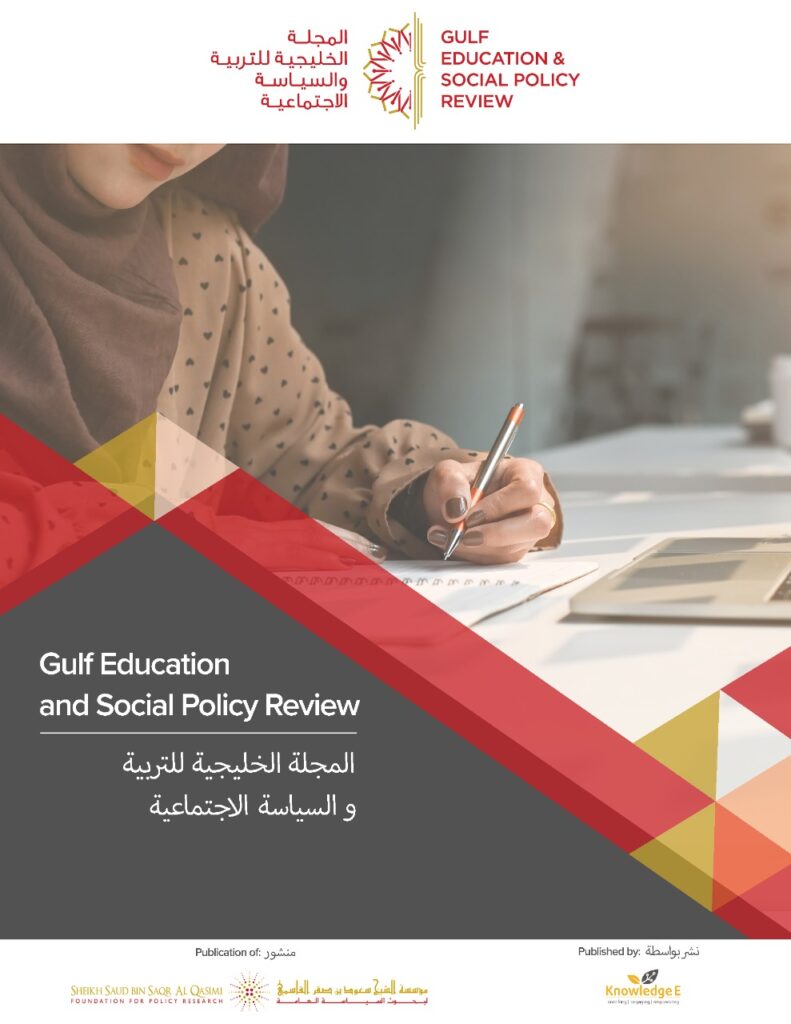
Gulf Education and Social Policy Review
ISSN: 2709-0191
Pioneering research on education and social policy in the Gulf region.
Call for Papers - Early Development
Childhood in Focus: Early Development in the Arab Region and Africa
Early childhood is a crucial period of development, recognized globally with specific targets in the UN Sustainable Development Goals (SDGs). During these years, rapid brain development and heightened sensitivity to experiences occur, making positive early experiences essential for fostering growth and lifelong well-being (Lake, 2011; Nelson, 2000). Conversely, negative experiences and inadequate stimulation can hinder a child’s ability to reach their full developmental potential and to become a capable member of society (Britto et al., 2017; Lake, 2011). To date, most early childhood development (ECD) research has predominantly been shaped by Western perspectives from the Global North, which limits our understanding of the diverse developmental pathways available to children across different contexts. While cross-cultural research has enriched developmental theories, the over-representation of Western samples has resulted in a skewed view of how children grow and thrive. This issue is further compounded by the challenges that many researchers from the Global South face when trying to publish their findings in high-impact journals (Draper et al., 2022). As a result, there is an urgent need to broaden the scope of ECD research to include a more balanced representation of perspectives that can illuminate the complexities of child development in various cultural settings.
GESPR invites submissions on a range of topics and disciplines investigating issues relevant to young children’s (up to 8 years) development in the Arab Region, with a special emphasis on the Gulf and Arabian Peninsula, and in Africa. This special issue focuses on empirical articles, using quantitative, qualitative or mixed-method approaches. Topics can include but are not limited to:
- Caregiver-child interactions (including parents, siblings, grandparents, nannies, teachers, among others)
- Peer interactions
- Home learning environment
- Early childhood education (formal and informal)
- Early childhood interventions
- Children’s skills development (including, cognitive, social, emotional, and behavioral skills)
- Children’s and families’ wellbeing and mental health
- Family processes
Authors who plan to submit a manuscript for the special issue are asked to submit a letter of intent by 31 March 2025, including: tentative title and 5-6 keywords; names and affiliations of anticipated authors (indicating the corresponding author); brief description (500 words or less) of the study including an explanation of the perceived fit between the submission and the topic of the special issue; and brief description of the status of the project to ensure fit with the special issue timeline (in 2 sentences).
Following the review of received letters of intent, selected authors will be contacted by the Guest Editors by 30 April 2025 and invited to submit a full manuscript (in Arabic or English between 6000 to 8000 words in length) by 32 August 2025 that will be subjected to peer review. All submissions must contain original unpublished work not being considered for publication elsewhere.
Authors submitting manuscripts for consideration for publication in the special issue will be asked to review a manuscript submitted by another potential contributor. This will help ensure a timely and efficient peer review process.
You may contact the Guest Editors of this special issue, Dr. Antje von Suchodoletz (avs5@nyu.edu) and Dr. Pamela Wadende (pamela.wadende@kisiiuniversity.ac.ke), should you have further questions.
The letter of intent needs to be submitted by email to the Guest Editors and Natasha Mansur (natasha.m@alqasimifoundation.rak.ae) by 31 March 2025.
A peer-reviewed, bilingual (English/Arabic) academic journal, GESPR is dedicated to providing education and social policy research and insights on the Gulf region and beyond to a readership that includes regional and international scholars, practitioners, organizations, and policymakers to inform education and development agendas in the Gulf and beyond. GESPR seeks to address dissemination gaps and encourage critical, data-driven reflection, evaluation, and contextualization of the various factors, influences, and rapid reforms that are taking place in the Gulf’s complex development landscapes.
References:
Britto, P. R., Lye, S. J., Proulx, K., Yousafzai, A. K., Matthews, S. G., Vaivada, T., … & Bhutta, Z. A. (2017). Nurturing care: promoting early childhood development. The Lancet, 389(10064), 91-102.
Draper, C. E., Barnett, L. M., Cook, C. J., Cuartas, J. A., Howard, S. J., McCoy, D. C., … & Yousafzai, A. K. (2023). Publishing child development research from around the world: An unfair playing field resulting in most of the world’s child population under‐represented in research. Infant and Child Development, 32(6), e2375.
Lake, A. (2011). Early childhood development—global action is overdue. The Lancet, 378(9799), 1277-1278.
Nelson, C. A. (2000). Neural plasticity and human development: The role of early experience in sculpting memory systems. Developmental Science, 3(2), 115-136.